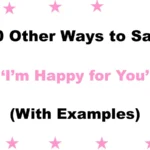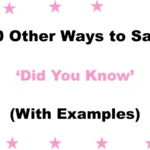Finding the right words to express gratitude or relief can make a big difference in how your message feels. Sometimes, saying “Thank God” might be perfect, but other times you want to add a little more warmth, personification, or even creativity. Using alternatives can help you convey your feelings in a way that resonates deeper with your listener or reader.
Whether you’re sharing relief after a difficult moment or expressing gratitude for a blessing, these 30 other ways to say “Thank God” will give you thoughtful, meaningful options. Let’s explore these phrases together, along with explanations and examples to help you choose the best fit for any situation.
What Does “Thank God” Mean?
The phrase “Thank God” is an expression of gratitude or relief directed toward a higher power or fate. It is often used to acknowledge that something positive has happened, especially after a period of worry or uncertainty. This phrase carries a tone of thankfulness and sometimes spiritual recognition.
When to Use “Thank God”
Use “Thank God” when you feel relieved or thankful for an outcome that was uncertain or potentially negative. It is appropriate in moments of personal victory, safety, success, or recovery, often when you want to express humility and gratitude.
Is It Professional/Polite to Say “Thank God”?
In professional settings, saying “Thank God” can sometimes be seen as informal or religiously specific. It’s usually better to use neutral alternatives like “I’m grateful” or “Thankfully.” However, among colleagues who share similar beliefs or in casual environments, it can be perfectly polite and heartfelt.
Pros and Cons of Saying “Thank God”
Pros:
- Expresses heartfelt gratitude.
- Shows humility and recognition of help beyond oneself.
- Conveys relief clearly and effectively.
Cons:
- May feel too informal or religious for some audiences.
- Might exclude people of different beliefs.
- Can be overused and lose impact if said too frequently.
Synonyms for “Thank God”
- Praise the Lord
- Thank heavens
- Blessed be
- Thank goodness
- Hallelujah
- Grateful beyond words
- What a relief
- Thank the universe
- Thank the stars
- I’m so thankful
- God be praised
- Glory be
- Much appreciated
- I’m relieved
- Forever grateful
- Thanks a million
- Thank the powers that be
- I’m so blessed
- Count my blessings
- Praise be
- I’m thankful beyond measure
- My gratitude knows no bounds
- All thanks to fate
- I’m sincerely grateful
- Thanks be to God
- Feeling thankful
- Grateful from the heart
- Deeply thankful
- Thank the heavens above
- My heartfelt thanks
1. Praise the Lord
Definition: A religious expression of gratitude directed toward God, commonly used in Christian contexts.
Explanation: This phrase is often used to show joy and thankfulness after a positive event, especially in spiritual or religious settings.
Scenario Example: “Praise the Lord, the surgery went well!”
Best Use: When expressing gratitude within religious or faith-based conversations.
Worst Use: In secular or professional contexts where religion is not relevant.
Tone: Reverent, joyful, spiritual.
2. Thank heavens
Definition: A more neutral expression of relief or gratitude, implying thanks to fate or divine forces.
Explanation: Used to express relief, often in moments of surprise or near-miss situations.
Scenario Example: “Thank heavens we caught the last train!”
Best Use: Casual conversations to show relief without overt religious references.
Worst Use: Very formal or scientific discussions.
Tone: Informal, relieved.
3. Blessed be
Definition: A phrase expressing blessing and gratitude, often used in spiritual or poetic contexts.
Explanation: It communicates a feeling of being fortunate and thankful, sometimes with a mystical touch.
Scenario Example: “Blessed be, the rain finally came to save the crops.”
Best Use: Spiritual gatherings or artistic expressions.
Worst Use: Business or secular conversations.
Tone: Poetic, reverent.
4. Thank goodness
Definition: An informal way to express relief or gratitude.
Explanation: This is a widely used phrase to show thanks for something positive that happened.
Scenario Example: “Thank goodness you’re okay after the accident.”
Best Use: Everyday conversations, friendly settings.
Worst Use: Formal or professional writing.
Tone: Casual, thankful.
5. Hallelujah
Definition: A religious exclamation of praise and joy, originally Hebrew, used in Christian worship.
Explanation: It’s often shouted or exclaimed when celebrating good news or relief.
Scenario Example: “Hallelujah! We passed the exam!”
Best Use: Religious celebrations or very joyful moments.
Worst Use: Dry or formal contexts.
Tone: Exultant, spiritual.
6. Grateful beyond words
Definition: Expressing gratitude so deep that it cannot be fully described with language.
Explanation: A heartfelt way to show intense thankfulness.
Scenario Example: “I’m grateful beyond words for all your support.”
Best Use: Personal messages, thank-you notes.
Worst Use: Very brief or casual chats.
Tone: Sincere, emotional.
7. What a relief
Definition: A phrase expressing a feeling of alleviation from worry or stress.
Explanation: It’s commonly used when a feared outcome is avoided.
Scenario Example: “What a relief that the test results were negative.”
Best Use: Casual conversations about health, safety, or stress.
Worst Use: Formal thank-you messages.
Tone: Relaxed, relieved.
8. Thank the universe
Definition: A non-religious, spiritual way to show gratitude toward fate or the cosmos.
Explanation: Used by those who prefer broader or non-traditional expressions of thanks.
Scenario Example: “Thank the universe for this unexpected opportunity.”
Best Use: Spiritual but non-religious contexts.
Worst Use: Highly formal or strictly religious settings.
Tone: Spiritual, inclusive.
9. Thank the stars
Definition: A poetic phrase showing gratitude, implying cosmic or celestial forces helped.
Explanation: Often used in a whimsical or romantic way.
Scenario Example: “I thank the stars every day for my friends.”
Best Use: Artistic or poetic expressions.
Worst Use: Practical or business communication.
Tone: Poetic, hopeful.
10. I’m so thankful
Definition: A straightforward declaration of gratitude.
Explanation: Simple and universally appropriate, expressing genuine thanks.
Scenario Example: “I’m so thankful for your help during this tough time.”
Best Use: Almost all situations, especially personal communication.
Worst Use: None particularly; very versatile.
Tone: Warm, sincere.
11. God be praised
Definition: Another religious phrase giving praise to God for good outcomes.
Explanation: Used to acknowledge divine intervention or blessing.
Scenario Example: “God be praised, the storm has passed safely.”
Best Use: Religious contexts, spiritual conversations.
Worst Use: Secular or formal business discussions.
Tone: Reverent, thankful.
12. Glory be
Definition: An expression of praise and thanks to God, often used in Christian prayers.
Explanation: Shows deep spiritual gratitude and reverence.
Scenario Example: “Glory be for the safe arrival of our loved ones.”
Best Use: Religious settings or personal spiritual reflections.
Worst Use: Secular or corporate environments.
Tone: Reverent, spiritual.
13. Much appreciated
Definition: A polite and professional way to express thanks.
Explanation: Suitable for formal and informal settings, showing gratitude clearly and respectfully.
Scenario Example: “Your assistance with the project is much appreciated.”
Best Use: Workplace, professional emails, customer service.
Worst Use: Very emotional or personal thanks.
Tone: Formal, courteous.
14. I’m relieved
Definition: A straightforward way to express the easing of anxiety or stress.
Explanation: Conveys relief rather than just gratitude, often following a positive result.
Scenario Example: “I’m relieved to hear the test went well.”
Best Use: Personal and professional contexts.
Worst Use: When gratitude is the main focus.
Tone: Calm, sincere.
15. Forever grateful
Definition: A deep, enduring expression of gratitude.
Explanation: Indicates lasting thankfulness beyond the immediate moment.
Scenario Example: “I’m forever grateful for your unwavering support.”
Best Use: Personal letters, speeches, or thank-you cards.
Worst Use: Casual text messages.
Tone: Emotional, heartfelt.
16. Thanks a million
Definition: An informal, enthusiastic way to say thank you.
Explanation: Shows strong appreciation in a friendly manner.
Scenario Example: “Thanks a million for picking me up!”
Best Use: Casual conversations with friends or family.
Worst Use: Formal business settings.
Tone: Friendly, energetic.
17. Thank the powers that be
Definition: A humorous or lighthearted way to acknowledge forces beyond control.
Explanation: Implies gratitude to fate or authority figures.
Scenario Example: “Thank the powers that be we finished on time.”
Best Use: Informal, humorous conversations.
Worst Use: Formal or religious contexts.
Tone: Casual, playful.
18. I’m so blessed
Definition: Expressing a feeling of having received good fortune or favor.
Explanation: Often spiritual but also used more broadly.
Scenario Example: “I’m so blessed to have such caring friends.”
Best Use: Personal or religious conversations.
Worst Use: Strictly professional or secular environments.
Tone: Warm, thankful.
19. Count my blessings
Definition: A reflective phrase encouraging recognition of good things in life.
Explanation: Often used to express gratitude for multiple positive aspects.
Scenario Example: “I count my blessings every day, especially my health.”
Best Use: Personal reflections or conversations.
Worst Use: Business or urgent communications.
Tone: Thoughtful, grateful.
20. Praise be
Definition: A short religious phrase praising God or a higher power.
Explanation: Often used after positive news or events.
Scenario Example: “Praise be, the mission was successful.”
Best Use: Religious contexts.
Worst Use: Secular or formal business.
Tone: Reverent, joyous.
21. I’m thankful beyond measure
Definition: Expresses very deep gratitude without limits.
Explanation: Highlights the significance of the gratitude felt.
Scenario Example: “I’m thankful beyond measure for your kindness.”
Best Use: Personal notes, heartfelt speeches.
Worst Use: Casual conversations.
Tone: Emotional, sincere.
22. My gratitude knows no bounds
Definition: A poetic way of expressing limitless thankfulness.
Explanation: Used to emphasize intense gratitude.
Scenario Example: “My gratitude knows no bounds for your help.”
Best Use: Formal thank-you letters, speeches.
Worst Use: Informal chats.
Tone: Formal, heartfelt.
23. All thanks to fate
Definition: A phrase crediting fate or destiny for a positive outcome.
Explanation: Often used when something good happens unexpectedly.
Scenario Example: “All thanks to fate, we met on that trip.”
Best Use: Casual storytelling.
Worst Use: Formal writing.
Tone: Casual, reflective.
24. I’m sincerely grateful
Definition: A clear and honest expression of gratitude.
Explanation: Suitable for both personal and professional contexts.
Scenario Example: “I’m sincerely grateful for your support.”
Best Use: Formal emails, thank-you notes.
Worst Use: Very casual conversations.
Tone: Polite, respectful.
25. Thanks be to God
Definition: A traditional religious phrase expressing thanks to God.
Explanation: Used in moments of relief or joy in religious contexts.
Scenario Example: “Thanks be to God, the baby arrived safely.”
Best Use: Religious or spiritual settings.
Worst Use: Secular or corporate environments.
Tone: Reverent, thankful.
26. Feeling thankful
Definition: A simple phrase expressing current gratitude.
Explanation: Often used in casual conversation or social media.
Scenario Example: “Feeling thankful for a wonderful day with family.”
Best Use: Informal chats, personal posts.
Worst Use: Formal writing.
Tone: Casual, warm.
27. Grateful from the heart
Definition: A phrase emphasizing genuine, heartfelt thanks.
Explanation: Shows deep appreciation beyond mere politeness.
Scenario Example: “I’m grateful from the heart for your generosity.”
Best Use: Personal thank-you messages.
Worst Use: Brief or impersonal communication.
Tone: Warm, sincere.
28. Deeply thankful
Definition: Expresses profound gratitude.
Explanation: Often used in serious or meaningful contexts.
Scenario Example: “I’m deeply thankful for your understanding.”
Best Use: Personal or formal communications.
Worst Use: Casual texts.
Tone: Respectful, earnest.
29. Thank the heavens above
Definition: A poetic and spiritual way to express relief or gratitude.
Explanation: Implies thanks to divine forces or fate.
Scenario Example: “Thank the heavens above, we made it home safely.”
Best Use: Personal or poetic expressions.
Worst Use: Formal business settings.
Tone: Poetic, reverent.
30. My heartfelt thanks
Definition: A sincere and warm expression of gratitude.
Explanation: Shows genuine appreciation with emotional depth.
Scenario Example: “My heartfelt thanks to everyone who helped.”
Best Use: Personal letters, speeches, thank-you notes.
Worst Use: Very brief or casual contexts.
Tone: Warm, sincere.
Conclusion
Expressing gratitude is a powerful way to connect with others and show appreciation. While “Thank God” is a familiar and heartfelt phrase, exploring alternatives allows you to tailor your message to fit different tones, settings, and relationships. Whether you choose a religious expression like “Praise the Lord” or a more neutral phrase like “Much appreciated,” the key is to communicate with warmth, sincerity, and care. Using these varied expressions thoughtfully can deepen your connections and make your gratitude feel even more meaningful.
FAQs
1. What does “Thank God” really mean?
“Thank God” is an expression of gratitude or relief typically directed toward a higher power or fate. It’s often said when something positive happens after worry or uncertainty, showing recognition and thankfulness.
2. Is it okay to say “Thank God” in professional settings?
While saying “Thank God” can be heartfelt, it may not always be appropriate in formal or professional environments because it has a religious tone. Neutral alternatives like “Thankfully” or “Much appreciated” are often better choices in these settings.
3. Can I use alternatives to “Thank God” in casual conversations?
Absolutely! Many alternatives such as “Thank goodness,” “What a relief,” or “Thanks a million” work well in casual conversations and can help add variety and warmth to your expressions of gratitude.
4. Are all these alternatives religious?
No. Some alternatives like “Praise the Lord” or “Hallelujah” are explicitly religious, while others like “Thank the universe” or “Much appreciated” are neutral and suitable for secular use.
5. How can I choose the right alternative to “Thank God”?
Consider the context, audience, and tone. For religious or spiritual conversations, religious phrases fit well. For professional or diverse groups, neutral expressions are best. Think about whether you want to sound formal, casual, poetic, or heartfelt.
6. Can saying “Thank God” exclude others?
Sometimes, yes. Because “Thank God” references a particular faith, it might unintentionally exclude people with different beliefs. Using inclusive alternatives can make your message feel more welcoming.
7. What’s the difference between “Thank God” and “Thank goodness”?
“Thank God” usually has a spiritual or religious meaning, while “Thank goodness” is a more secular and informal way to express relief or gratitude.

Mariah Cannon is a dedicated Senior Content Specialist at GrammarPeaks, known for her clear, engaging writing and deep knowledge of English grammar and usage. With a background in linguistics and years of experience in content development, Mariah crafts informative and accessible articles that empower readers to master the nuances of the English language. Her work reflects a commitment to clarity, education, and helping others express themselves with confidence.





